Economic statistics is a topic in applied statistics and applied economics that concerns the collection, processing, compilation, dissemination, and analysis of economic data. It is closely related to business statistics and econometrics. It is also common to call the data themselves "economic statistics", but for this usage, "economic data" is the more common term.
Agricultural economics is an applied field of economics concerned with the application of economic theory in optimizing the production and distribution of food and fiber products. Agricultural economics began as a branch of economics that specifically dealt with land usage. It focused on maximizing the crop yield while maintaining a good soil ecosystem. Throughout the 20th century the discipline expanded and the current scope of the discipline is much broader. Agricultural economics today includes a variety of applied areas, having considerable overlap with conventional economics. Agricultural economists have made substantial contributions to research in economics, econometrics, development economics, and environmental economics. Agricultural economics influences food policy, agricultural policy, and environmental policy.
Computational Economics is an interdisciplinary research discipline that involves computer science, economics, and management science. This subject encompasses computational modeling of economic systems. Some of these areas are unique, while others established areas of economics by allowing robust data analytics and solutions of problems that would be arduous to research without computers and associated numerical methods.
Media economics embodies economic theoretical and practical economic questions specific to media of all types. Of particular concern to media economics are the economic policies and practices of media companies and disciplines including journalism and the news industry, film production, entertainment programs, print, broadcast, mobile communications, Internet, advertising and public relations. Deregulation of media, media ownership and concentration, market share, intellectual property rights, competitive economic strategies, company economics, "media tax" and other issues are considered parts of the field. Media economics has social, cultural, and economic implications. Regular study of media economic issues began in the 1970s but flourished in the 1980s with the addition of classes on the subject at U.S. and European universities. The Journal of Media Economics began publishing in 1988, edited by Robert G. Picard, one of the founding fathers of the discipline. Since that time the field of inquiry has flourished and there are now hundreds of universities offering courses and programs in media economics. Other significant figures in the field have included Steven S. Wildman, Alan Albarran, Bruce M. Owen, Ben Compaine, Ghislain Deslandes, Stuart McFadyen, Gillian Doyle, Karl Erik Gustafsson, Lucy Küng, Gregory Ferrell Lowe, Nadine Toussaint Desmoulins, Achour Fenni, Amanda D. Lotz, and Stephen Lacy.
Kenneth Jan Singleton is an American economist. He is a leading figure in empirical financial economics, and a faculty member at Stanford University. As the Adams Distinguished Professor of Management, Emeritus at Stanford Graduate School of Business, Singleton teaches a variety of degree courses in finance.
Applied economics is the study as regards the application of economic theory and econometrics in specific settings. As one of the two sets of fields of economics, it is typically characterized by the application of the core, i.e. economic theory and econometrics to address practical issues in a range of fields including demographic economics, labour economics, business economics, industrial organization, agricultural economics, development economics, education economics, engineering economics, financial economics, health economics, monetary economics, public economics, and economic history. From the perspective of economic development, the purpose of applied economics is to enhance the quality of business practices and national policy making.

William Arnold Barnett is an American economist, whose current work is in the fields of chaos, bifurcation, and nonlinear dynamics in socioeconomic contexts, econometric modeling of consumption and production, and the study of the aggregation problem and the challenges of measurement in economics.
Economics education or economic education is a field within economics that focuses on two main themes:

Sir Richard William Blundell CBE FBA is a British economist and econometrician.
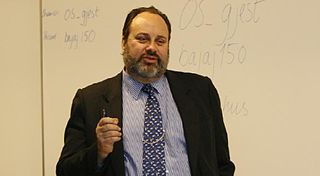
Robert Georges Picard is an American writer and scholar in the field of media businesses and media policy economics. He heavily influenced media economics studies.

Steven S. Wildman is a U.S. scholar, academician and researcher who teaches and researches at one of the top-rated American communications programs at the Department of Telecommunication, Information Studies and Media at Michigan State University in East Lansing, Michigan. Wildman also serves as co-director of the university's Quello Center for Telecommunication Management and Law.
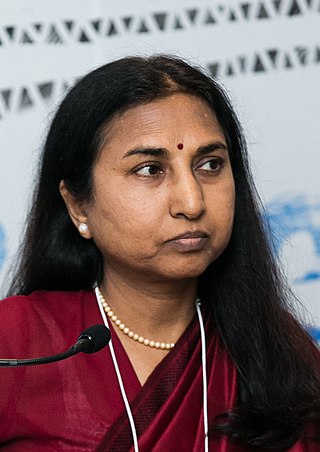
Bina Agarwal is an Indian development economist and Professor of Development Economics and Environment at the Global Development Institute at The University of Manchester. She has written extensively on land, livelihoods and property rights; environment and development; the political economy of gender; poverty and inequality; legal change; and agriculture and technological transformation.
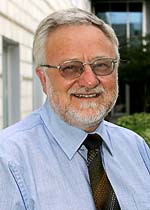
Georges Dionne is a full professor of finance who holds the Canada Research Chair in Risk Management at HEC Montréal. He has been a visiting scholar in the Department of Risk Management and Insurance at Georgia State University and in the Economics Department at Ecole Polytechnique in France for many years.
The Deutsche Bank Prize in Financial Economics honors renowned researchers who have made influential contributions to the fields of finance and money and macroeconomics, and whose work has led to practical and policy-relevant results. It was awarded biannually from 2005 to 2015 by the Center for Financial Studies (CFS), in partnership with Goethe University Frankfurt, and is sponsored by Deutsche Bank Donation Fund. The award carried an endowment of €50,000, which was donated by the Stiftungsfonds Deutsche Bank im Stifterverband für die Deutsche Wissenschaft.
John Michael Van Reenen OBE is the Ronald Coase School Professor at the London School of Economics. He is also Director of the Programme On Innovation and Diffusion (POID) at the Centre for Economic Performance. He was appointed an Officer of the Order of the British Empire (OBE) and received the Yrjö Jahnsson Award.

The American Journal of Business is a biannual peer-reviewed academic journal of business studies that is published by Emerald Group Publishing. It covers research in accountancy, finance, information systems, management, marketing, operations management, and strategic management. The journal was established in 1985 as the Mid-American Journal of Business, as the original member universities were in the Mid-American Conference. In 2007, it obtained its current name. It is currently sponsored by 10 universities accredited by the Association to Advance Collegiate Schools of Business, including Ball State University, Bowling Green State University, Central Michigan University, Cleveland State University, Miami University, Northern Illinois University, Ohio University, the University of Toledo, the University of Akron, and Western Michigan University. Each university provides a board member. The editors-in-chief are Richard Reed and Susan F. Storrud-Barnes. Occasionally, the journal publishes special issues dedicated to a single topic.
Wirtschaftsdienst – Zeitschrift für Wirtschaftspolitik is a peer-reviewed academic journal covering economic and social policy issues in Germany or affecting Germany. It also publishes topics of the European Union in the fields of trade, econometrics, environment, and monetary policy. The editor-in-chief is Jun.-Prof. Dr. Christian Breuer and it is published by Springer Science+Business Media. The journal is an official publication of the German National Library of Economics (ZBW). It was established in 1916 and is one of the oldest academic economics journals.
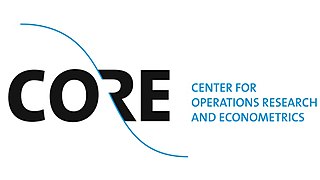
The Center for Operations Research and Econometrics (CORE) is an interdisciplinary research institute of the University of Louvain (UCLouvain) located in Louvain-la-Neuve, Belgium. Since 2010, it is part of the Louvain Institute of Data Analysis and Modeling in economics and statistics (LIDAM), along with the Institute for Economic and Social Research (IRES), Louvain Finance (LFIN) and the Institute of Statistics, Biostatistics and Actuarial Sciences (ISBA).
Eleonora Patacchini is an economist specializing in applied economics and applied statistics who grew up in Italy with her mother who was also a professor. She is a professor and associate department chair at Cornell University in the Department of Economics. Her research focuses on the empirical analysis of behavioral models of strategic interactions for decision making. Patacchini is an associate editor at Journal of Urban Economics and Statistical Methods & Applications. She is a columnist at the VOX CEPR Policy Portal where research-based policy analysis and commentary from leading economists are published frequently. She is also a co-editor of E-journal Economics and associate editor of the Journal of Urban Economics.
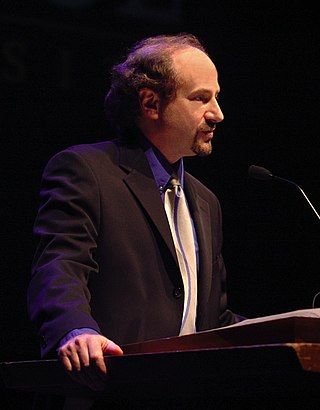
Fred Mannering is an American scientist/engineer who is most known for the development and application of statistical and econometric methods to study highway safety, economics, travel behavior, and a variety of engineering-related problems.
Picard, R. (1988): Introduction. Journal of Media Economics, 1(1), 3.








